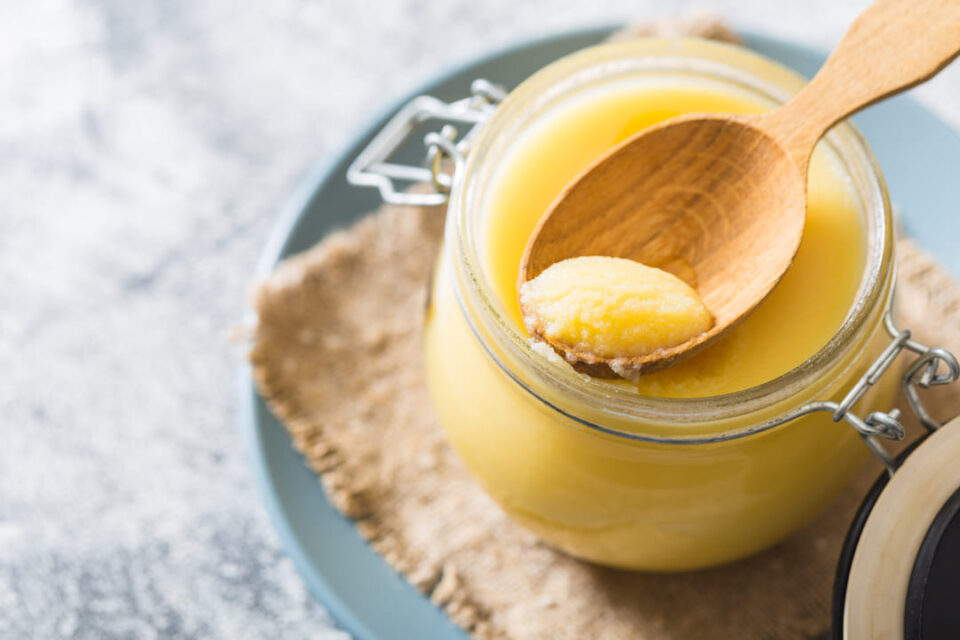As an Ayurvedic practitioner, I’ve always been fascinated by the power of food as medicine. And when it comes to managing diabetes, there’s one ingredient that keeps coming up in my conversations with patients: ghee. Yes, that golden, luscious clarified butter that’s been a staple of Ayurvedic healing for centuries. Today, I’m diving deep into the science, the tradition, and the patient experiences to find out. So grab a cup of chai/coffee, settle in, and let’s talk about all things ghee – the good, the bad, and the deliciously buttery.
In Ayurveda, we believe that food is medicine, and ghee is no exception. This ancient ingredient is made by simmering butter until the water evaporates and the milk solids settle at the bottom, leaving behind pure, nutrient-rich butterfat. The result is a luscious, golden liquid with a nutty, almost caramel-like flavor that adds depth and richness to any dish.
But ghee isn’t just delicious – it’s also packed with health benefits. According to Ayurvedic principles, ghee is considered a “sattvic” food, meaning it promotes balance, clarity, and vitality. It’s believed to nourish the body’s tissues, enhance digestion, and even improve mental function. And when it comes to diabetes management, ghee has some unique properties that make it a valuable addition to your diet.
First and foremost, ghee contains zero carbohydrates or sugars, making it an ideal choice for those looking to stabilize their blood glucose levels. But that’s not all – recent studies have also suggested that the unique blend of fatty acids in ghee may help reduce inflammation and improve insulin sensitivity, two key factors in managing diabetes.
In one study, rats fed a high-fat diet along with ghee showed lower fasting blood glucose and improved insulin sensitivity compared to those consuming butter or coconut oil. Another review concluded that the fatty acids in ghee may have anti-inflammatory and insulin-sensitizing properties, though more research in humans is needed to confirm these effects.
So, how much ghee should you be consuming? As with all things in Ayurveda, moderation is key. I typically recommend no more than 1 tablespoon of ghee per day, always in the context of a balanced diet rich in whole grains, legumes, vegetables, and lean proteins. Some of my patients like to start their day with a teaspoon of ghee stirred into their morning milk or coffee, while others use it to sauté vegetables or drizzle over kitchari, the classic Ayurvedic healing dish, or rice or idlis.
Of course, it’s important to remember that ghee is still a concentrated source of fat and calories, so those looking to lose weight may need to be mindful of their intake. And while ghee itself won’t spike your blood sugar, combining it with high-glycemic foods like sugar or refined carbohydrates is best avoided for optimal glucose control.
Over the years, I’ve seen countless patients benefit from incorporating ghee into their diabetes management plan. Take Manish, 48, who grew up eating homemade ghee prepared by his mother. When he was diagnosed with diabetes, he feared he’d have to give up this beloved part of his culinary heritage. But by working together, we found a way to fit ghee into his diet in a balanced, mindful way – and his last A1c of 6.2% speaks to the success of this approach.
Or consider Divya, 62, who uses just a teaspoon of ghee per day to add satisfying flavor to her lentils and vegetables. For her, ghee is a small but meaningful way to connect with her cultural roots while still prioritizing her health. And then there’s Rohan, 35, who reserves ghee for special occasions and traditional recipes, relying on olive oil for everyday cooking – a perfect example of how moderation and flexibility are key to a sustainable diabetes-friendly diet.
In the end, my message is this: Ghee can be a valuable part of your diabetes management toolkit, but it’s not a magic bullet. Like all dietary choices, it needs to be approached with mindfulness, balance, and a holistic understanding of your unique needs and goals. As an Ayurvedic practitioner, I believe that true wellness comes from honoring both ancient wisdom and modern science, from nourishing the body and the soul in equal measure.
So go ahead, savor that golden spoonful of ghee – but do so with intention, respect, and a healthy dose of self-awareness. And remember, when it comes to diabetes management, the sweetest victories often come from the smallest, most sustainable changes. With ghee as your ally and Ayurveda as your guide, I do not doubt that you’ll find your path to balance, vitality, and vibrant health.


1 comment
Does ghee increase cholesterol? Those who have high cholesterol, can they include 1 tablespoon ghee per day in their diet or should they avoid?